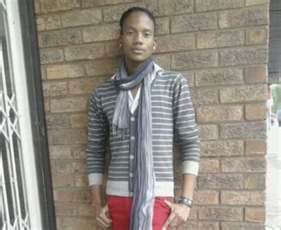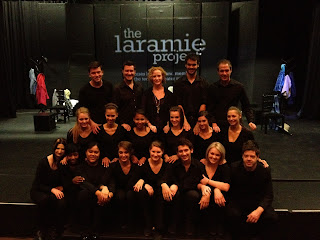On June 13th, and just prior to departing for South Africa, I read an international news article regarding the brutal murder of South African gay community leader Thapelo Makutle. As reported:
A young homosexual man
has been killed and his body mutilated in South Africa, according to LEGBO, a
local gay rights group. Thapelo
Makutle's body was found under a blanket with his throat cut and tongue
removed, parts of his genitals had been cut off and placed in his mouth,
witnesses said.
Fast forward to August when I engaged in a discussion with several theatre students regarding LGBT issues in South Africa. To my surprise, the death of Thapelo went largely unnoticed. I found this particularly disturbing since several of the students participating in the discussion were part of the LGBT community. I later learned that much of the international news received by Americans does not reach the majority of the South African population.
Fortunately for me, I was assigned to an office at UFS with Debeer Cloete, a fellow faculty member from the Department of Drama and Theatre Arts. Debeer specializes in film studies, and his knowledge regarding the subject is expansive. This background, coupled with effective teaching and performance skills, has earned high praise and respect from students and colleagues. Toward the middle of August Debeer and I decided to join forces and produce a drama that would address LGBT issues. Why? Although South Africa legalized same-sex marriage in 2006, the reality is that much of SA's LGBT community is extraordinarily oppressed, particularly in rural settings. One example is the practice of "corrective rape", defined as when a heterosexual man rapes a lesbian to "correct" her sexuality. With the highest statistics for rape and HIV in the world, the South African government does little to prosecute these crimes, which are relatively common and on the rise. To read more about this subject, google "corrective rape" or review a recent article in The New Yorker:
As Debeer and I proposed titles, I suggested Angels in America, a Pulitzer winner by American playwright Tony Kushner. Angels takes an extremely raw look at the issues of homosexuality, AIDS, religion, politics and opposing philosophies. This astonishing and ground-breaking play is of immense importance, and many theatres shy away from producing it due to its controversial themes. I thought it would be an interesting choice recognized for relevant topics and challenging plot structure/complex characters. My colleagues, all part of the discussion, unanimously said "NO". While our theatre faculty are quite a diverse and liberal bunch who agreed they loved the play, Bloemfontein was not ready for Angels' extreme themetic nature.
My next suggestion was The Laramie Project, written by American playwright Moises Kauffman. Debeer, who was familiar with the play, enthusiastically supported the proposal. With my directing background and his expertise in film, we believed Laramie would serve as an excellent platform for sparking dialogue regarding LGBT issues within the UFS community. In order to do this, we needed to make the death of American Matthew Shepherd and the experience of the Tectonic Theatre Company accessibleto the actors and audience members in Bloem. As part of our table work, we supplied ample dramaturgical information, including videos of Fred Phelps and the Westboro Baptist Church, which was new to the production team. We also provided info regarding the recent attacks and deaths of members from the LGBT community in SA, much of which the cast had no previous knowledge. It was important to make certain the actors, and eventually the crew, knew they were part of something that held great significance and weight within their country.
Additionally, Debeer used to wonderful effect the interweaving of still images and video clips that would be recognized by the audience as locations in both America and SA. Costumes also reflected this concept: for the role of Reggie, a policewoman from Laramie, Wyoming, the actress wore the coat of a recognizable officer from Bloemfontein. Instead of cowboy hats, male characters wore hats associated with ranchers from SA. Dialects were not American, but reflected the diverse accents found throughout SA. Finally, the cast consisted of black, white, colored, gay, and straight actors.
Since our concept was experimental in nature, we opted to forgo ticket sales and accept donations to benefit an LGBT campus club. For opening night, I arranged a panel discussion with a cross demographic of individuals from UFS. This included faculty, staff, and students from both the straight and LGBT community. To give you an idea as to the climate towards LGBT issues, an administrator, who has a strong interest in promoting LGBT issues on campus and throughout SA, agreed to serve on the panel. All panel members were given a series of questions which could be asked by the moderator. It was made clear that no one had to answer any particular questions as the nature of the event was a discussion and not a debate. The questions, formed by a theatre faculty member, were in no way devisive. Since the objective of the panel was to encourage and generate discussion among the audience after they left the theatre, all questions were broad in topic. I was asked, for example, to define and clarify the difference between the terms "tolerance" and "acceptance."
I was immensely surprised to open an email two hours prior to the opening performance from this same adminstrator stating that he/she did not feel comfortable with the discussion and would withdraw from his/her commitment. No further explanation or apology was given. We scrambled to find his replacement.
With one hour until opening, we received news that earlier in the day three transgender students at the University of the Western Cape had been brutally attacked just outside the entrance to a campus residence hall. As reported in the news, a UWC security guard stoody by and passively watched the attack. A policeman commented that the attack was a form of "stress relief".
The Laramie Project opened and ran with great success. However, the audience members who needed to fill the seats weren't there. Although South Africa certainly has made tremendous strides regarding human rights issues, much work needs to be done. Worldwide, more than 76 countries have made homosexuality an illegal crime, and homosexual acts are punishable by death in at least eight countries. The notion of tolerance is simply unacceptable.
My very good friend, Debeer Cloete.
__________________________________________________________________________________
Update:
The items collected for the village of Mwariki will ship to Kenya tomorrow. Some of the supplies collected from the recent benefit night:
Thank YOU, Indigenous Village, and to everyone else who donated to this project!



